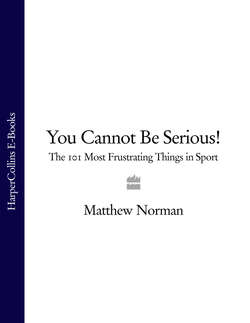Читать книгу You Cannot Be Serious!: The 101 Most Frustrating Things in Sport - Matthew Norman - Страница 29
Оглавление78
The Charlton Brothers
Are Jackie and Bobby Charlton Jewish? I wouldn’t normally ask, because the fact that they were respectively decent and exceptional at football would seem to offer a definitive answer to that question. And even if it doesn’t, the existence of coalminers among their north-east forebears surely settles the point.
However, there is something so immutably Jewish about their decades-long feud that you have to wonder. From Cain and Abel to Mike and Bernie Winters, and possibly (at the time of writing it remains too soon to be sure) David and Ed Miliband, the fraternal fallout has been a defining sub-strand in my people’s troubled history.
Whatever their genetic roots, the Charltons have been pests for almost as long as they have been broigus, to use that Yiddish term for non-speakers. One intriguing thing about them … but no, that’s too fanciful a thought even for this book. One mildly interesting thing they represent is an apparent paradox that is in fact no such thing. It is often commented, in mystification, that the greatest players tend to make the lousiest managers, and vice versa. The truth is that gifted individuals fixate on themselves, which is not a recipe for successful leadership, while the more mediocre need to think more about the team and their role within it to survive, which clearly is.
So it has been with the Charltons. Bobby, a magnificent midfielder for Manchester United and England, had one foray into management, wasting no time in easing Preston North End to relegation. Jackie, an effective clumper of a centre half for Leeds United and England, took both Middlesbrough and Sheffield Wednesday in the other direction before leading the Republic of Ireland to an unlikely World Cup quarter-final in 1990.
Forced to choose the Charlton with whom to be trapped in a lift, it would probably come down to the toss of a coin. Jackie has a slightly cruel, laconic wit, putting you in mind of the Duke of Edinburgh he facially resembles, but might drive you mad with the didacticism and unpalatability of his opinions about the state of the world and who is to blame for it (see Prince Philip, above). His inability in press conferences to remember the names of players he selected for Ireland minutes earlier further suggests a man who might, in that faulty elevator, thrice entertain you with the same anecdote within the same quarter-hour.
Bobby, on the other hand, would bore you close to a coma far quicker than the lack of oxygen. A drearier old fart English sport has never known. His monotone could be used by riot police who left their CS gas back at the station, while added to the stubbornness that saw him retain the combover for thirty years is a sullen taciturnity to chill the blood.
There is an excuse for Bobby’s failure to scintillate off the pitch as he once did on it, of course, and it pays credit to his elder brother’s fraternal sensibilities that despite acknowledging how the Munich air crash of 1958 affected the younger’s personality, Jackie disdains the making of any allowances.
The precise cause of the feud has fascinated scholars for decades, yet despite tireless research and the publication of both men’s autobiographies, it remains a source of mystery. All that is known beyond doubt is that it centred around their mother Cissie, an apparently domineering matriarchal figure whom Bobby resented for disrespecting his wife, Jackie in turn resenting Bobby for ignoring Cissie as a result. Jackie also resented Cissie, in his case for favouring the more talented Bobby when they were children, but expressed that by showering money and time upon her. Oddly for an older brother of such seemingly limitless self-confidence, he seems much the more sensitive of the two.
The most admirable thing about both, meanwhile, and the one and only thing that binds them, is their adamant refusal to acknowledge the other. Here they show unwonted good taste, and set an example the rest of us will, in the absence of a broken lift, be happy to follow.
